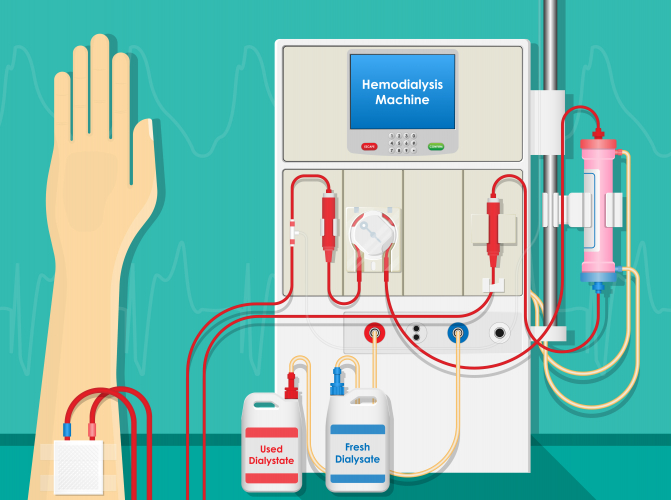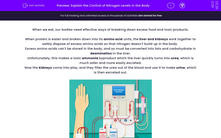When we eat, our bodies need effective ways of breaking down excess food and toxic products.
When protein is eaten and broken down into its amino acid units, the liver and kidneys work together to safely dispose of excess amino acids so that nitrogen doesn’t build up in the body.
Excess amino acids can't be stored in the body, and so must be converted into fats and carbohydrate in deamination in the liver.
Unfortunately, this makes a toxic ammonia byproduct which the liver quickly turns into urea, which is much safer and more easily excreted.
Now the kidneys come into play, and they filter the urea out of the blood and use it to make urine, which is then excreted out.

But sadly sometimes our kidneys stop working, leading to kidney failure, which needs serious treatment with dialysis, or organ transplant.
Dialysis involves a specialised machine taking over the kidneys’ role of blood filtration to preserve healthy blood content levels:
The dialysis machine takes poorly filtered blood and tries to mimic the content of a healthy person’s blood, meaning that it doesn’t just remove everything and put it back!
It has a partially permeable membrane through which ions and water can pass out of the blood, but big molecules like proteins can’t - this is normal as healthy people don’t excrete protein!
To prevent dissolved ions and glucose being removed too, the blood mixes with dialysis fluid which has the same concentration of these as healthy blood.
Only waste like urea and excess ions and water diffuse across the barrier out of the blood.
Dialysis can be a nuisance because it has to be done regularly and increases your risk of blood clots and infections.
So, clearly this experience is very unpleasant and actually costs the NHS a lot to run, but it can save lives by buying time for a living or recently dead organ donor match to be found, as organ transplant is the only current cure for kidney failure.
Now let's move on to some questions.








